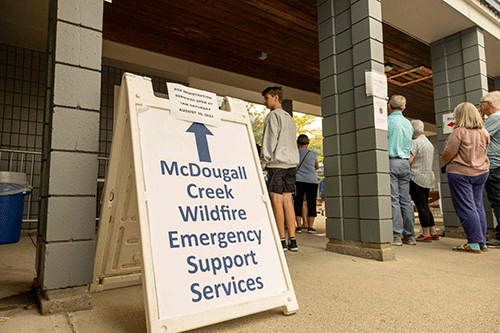KELOWNA - Officials in western Canada’s British Columbia implored tens of thousands of residents to heed evacuation orders Saturday as “rapidly evolving” wildfires threatened large parts of the scenic Okanagan Valley, including the city of Kelowna.
The situation in the popular boating and hiking destination was “highly dynamic,” said Bowinn Ma, the province’s minister of emergency management.
Around 30 000 people were under evacuation orders while another 36 000 were under alert to be ready to flee, she said.
“We cannot stress strongly enough how critical it is to follow evacuation orders when they are issued,” Ma stressed at an afternoon news conference.
“They are a matter of life and death not only for the people in those properties, but also for the first responders who will often go back to try to implore people to leave.”
Kelowna, a city of 150 000, was choked with thick smoke as it became the latest population centre hit by one of the many wildfires scorching Canada this summer.
British Columbia alone had 385 active wildfires by late Saturday night, according to government data.
Prime Minister Justin Trudeau said he had spoken with British Columbia Premier David Eby about the “rapidly evolving and incredibly devastating wildfire situation”, and pledged federal resources in responding to the disaster.
Blazes in the neighbouring Northwest Territories have meanwhile prompted the evacuation of regional capital Yellowknife, leaving the remote city of around 20 000 largely a ghost town.
Overnight rains brought some relief to Yellowknife on Saturday. However, “a little rain does not mean it’s safe to come back home,” warned Northwest Territories environment minister Shane Thompson.
“Though the surface may not show fire, it’s still active and it’s huge,” he said at a Saturday evening news conference, noting that temperatures were expected to rise again yesterday.
Yellowknife official Chris Greencorn praised the work crews were doing to build defences around the city, with large areas cleared to create firebreaks and pipes laid for sprinklers and water cannon.
“Basically, this represents approximately two full Yellowknife construction seasons completed in less than six days,” he said.
The exodus from Yellowknife and elsewhere means two-thirds of the near-Arctic territory’s population has been displaced, Thompson added.
The fires have caused “terrible loss,” Trudeau told reporters after meeting Yellowknife evacuees Friday as they arrived in Edmonton, Alberta, with no idea when they may return home.
In British Columbia, blazes have already destroyed several properties in West Kelowna, among them the Lake Okanagan Resort.
The historic property is known for having hosted high-profile visitors such as British prime minister Margaret Thatcher.
“It’s become evident that this event is going to leave a long-lasting scar on our community,” West Kelowna Fire Chief Jason Brolund said at a news conference on Saturday.
He said the previous day had been “one of the most difficult days of firefighting our department has ever faced.”
Eby announced on Saturday an emergency order halting non-essential visits to the area.
The order, which bans visitors from checking in at hotels and other temporary accommodation, covers Kelowna and the nearby towns of Kamloops, Oliver, Penticton and Vernon as well as Osoyoos near the US border.
“If you are currently in accommodation in these areas, we are asking you to voluntarily check out early and free up those spaces for evacuees and responders,” Ma urged.
Firefighters from Australia, Mexico, Brazil and Costa Rica, as well as eastern Canada, are assisting British Columbia to combat the blazes.
Canada is experiencing a record-setting wildfire season, with official estimates of more than 14 million hectares already burned -- roughly the size of Greece and almost twice the area of the last record of 7.3 million hectares. Four people have died so far.
- Nampa/AFP


